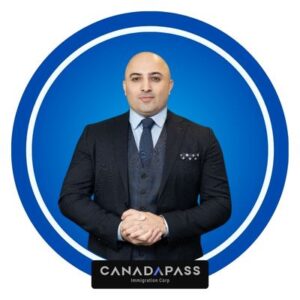Express Entry is a points-based immigration system launched by the Canadian government in 2015. It manages applications for permanent residence from skilled workers who wish to immigrate to Canada. It has become the main route for skilled worker immigration, offering a relatively faster and flexible process compared to other options.
Is Express Entry for you?
While Express Entry offers a pathway to permanent residence for many skilled workers, it is not accessible to everyone. This introductory guide aims to assist you in determining your eligibility and whether Express Entry aligns with your goals.
What you will find in this guide:
- Requirements and eligibility criteria: A clear explanation of the key factors affecting your eligibility, including education, work experience, language proficiency, and other points-based elements.
- Step-by-step process: A breakdown of the main steps involved in submitting an Express Entry profile, managing your application, and potentially receiving an invitation to apply for permanent residence.
- Additional resources: Links to official government websites and reliable information sources to help you deepen your understanding of the program
For personalised guidance: Navigating Express Entry can be complex. To ensure your application is on track, consider contacting CanadaPass for a free consultation with an experienced immigration expert. Learn what steps to take, get your questions answered, and build a strong profile for success.
Express Entry: An Overview for Skilled Workers
Express Entry is a system implemented by Immigration, Refugees and Citizenship Canada (IRCC) on January 1, 2015, to manage the intake of applications for permanent residence under the following programs:
- Federal Skilled Worker Class (FSWC)
- Federal Skilled Trades Class (FSTC)
- Canadian Experience Class (CEC)
- A portion of the Provincial Nominee Class (PNC)
Key features of Express Entry:
- Points-based system: Skilled workers are assigned points based on factors such as education, work experience, language proficiency, and age.
- Invitation to Apply (ITA): Applicants with the highest scores receive invitations to submit formal applications for permanent residence.
- Faster processing: IRCC aims to process 80% of complete applications within six months.
- First-come, first-served eliminated: Applicants are not prioritized based on submission date.
Important notes:
- Invitation required: Since January 1, 2015, applicants need an invitation from IRCC to apply under the listed programs.
- Quebec not included: Quebec has its own economic immigration programs not managed through Express Entry.
Step 1: Determine Your Eligibility for Express Entry
Express Entry is a point-based system implemented by Immigration, Refugees and Citizenship Canada (IRCC) to manage and process applications for permanent residence under three federal economic immigration programs:
(accordion)
Federal Skilled Worker Program (FSWP): Eligibility Requirements +
The Federal Skilled Worker Program (FSWP) is a pathway to Canadian permanent residency through Express Entry. To be eligible, you must meet the following criteria:
Work Experience:
- At least 12 months of continuous, full-time skilled work experience in a single occupation classified as National Occupation Classification (NOC) Training, Education, Experience, Responsibilities (TEER) category 0, 1, 2, or 3.
- Equivalent part-time experience may be considered.
Language Proficiency:
- Demonstrate proficiency in English or French through an approved language test like IE
- LTS or TEF, achieving a score equivalent to Canadian Language Benchmark (CLB) 7 or higher
Education:
- Minimum education equivalent to a Canadian high school diploma.
- If your education was outside Canada, an Educational Credentials Assessment (ECA) is required to verify its equivalency
Points:
- Score at least 67 points on the Federal Skilled Worker Points Grid, which evaluates factors like age, work experience, education, language proficiency, and adaptability.
Settlement Funds:
- Demonstrate sufficient financial resources to support yourself and your family in Canada without relying on social assistance. The required amount depends on family size.
(accordion)
Canadian Experience Class (CEC): Eligibility Overview +
The Canadian Experience Class (CEC) allows skilled workers who have gained Canadian work experience to apply for permanent residency through Express Entry. To be eligible, you must meet the following requirements:
Work Experience:
- Hold at least 12 months of full-time (or equivalent part-time) skilled work experience in Canada within the past three years.
- The experience must be legal and obtained while holding a valid work permit.
- Accepted occupations fall under National Occupational Classification (NOC) Skill Type 0, Skill Level A or B.
- Combining experience in two different skilled NOC codes within the timeframe is acceptable.
Language Proficiency:
- Demonstrate language proficiency in English or French at the level required for your specific job title, as defined by the Canadian Language Benchmark (CLB).
- Approved language tests like IELTS or TEF can verify your proficiency in speaking, reading, listening, and writing.
Residency:
- Plan to live outside the province of Quebec upon gaining permanent residency.
(accordion)
Federal Skilled Trades (FST): Eligibility Requirements +
The Federal Skilled Trades Program (FST) allows skilled tradespeople to apply for Canadian permanent residency through Express Entry. To be eligible, you must meet the following criteria:
Language Proficiency:
- Demonstrate proficiency in English or French through an approved language test.
- Achieve a minimum score of Canadian Language Benchmark (CLB) 5 for speaking and listening, and CLB 4 for reading and writing.
Work Experience:
- Possess at least two years of full-time (or equivalent part-time) paid work experience in a skilled trade within the past five years.
- The experience must demonstrate your ability to perform the essential duties of the occupation
Job Offer or Certificate:
- Have a valid full-time job offer for at least one year in the skilled trade from one or two Canadian employers, or
- Hold a valid certificate of qualification in the skilled trade from a Canadian provincial or territorial authority.
Additional Notes:
- The list of eligible skilled trades is defined by the National Occupational Classification (NOC).
- Further information on specific requirements and application procedures can be found on the official Immigration, Refugees and Citizenship Canada (IRCC) website.
Step 2: Estimate Your Comprehensive Ranking System (CRS) Score
Before creating an Express Entry profile, consider estimating your Comprehensive Ranking System (CRS) score. This score determines your ranking within the Express Entry pool and your chances of receiving an Invitation to Apply (ITA) for permanent residency.
Why estimate your score before creating a profile?
- Early assessment: Verify if you meet the minimum CRS score of 300 for pool entry before acquiring language test results or an Educational Credentials Assessment (ECA).
- Planning and priority: Estimating your score can help prioritize preparation tasks and optimize your Express Entry application strategy.
Calculating your CRS score:
The CRS system considers various factors, including:
- Age: Points decrease with age.
- Education: Higher levels of education earn more points.
- Language proficiency: Demonstrating strong English or French skills earns points.
- Work experience: Skilled work experience in Canada or abroad contributes points.
- Other factors: Adaptability, arranged employment, and designated provincial nominations can also add points.
Estimating your score:
To get a preliminary idea of your potential CRS score, you can use the official IRCC CRS tool:
- Comprehensive Ranking System (CRS) tool:
https://ircc.canada.ca/english/immigrate/skilled/crs-tool.asp
Remember:
- The CRS tool provides an estimate and your actual score may vary slightly.
- Meeting the minimum score guarantees pool entry, but not an ITA.
- High CRS scores significantly increase your chances of receiving an ITA.
Step 3: Gather Required Documents
Before entering the Express Entry pool, ensure you have gathered the necessary
documents for your profile:
Language Test Scores:
- Demonstrate English or French proficiency through an approved test like IELTS General Training for English or TEF for French.
- Minimum score requirements vary by program. Please review the specific requirements for your chosen program.
Educational Credentials Assessment (ECA):
- For the Federal Skilled Worker Program, an ECA is mandatory to verify your non-Canadian education against Canadian standards.
- Recommended for Canadian Experience Class and Federal Skilled Trades Program applicants, as education impacts your Comprehensive Ranking System (CRS) score.
- Not required if you completed your education in Canada.
Valid Passport:
- A valid passport is essential for submitting your Express Entry profile.
- In exceptional cases, alternative identification documents may be accepted if obtaining a passport is impossible.
Additional Considerations for Spouses or Common-Law Partners:
- If applying with a spouse or partner, evaluate each other’s qualifications before proceeding.
- Designate one person as the principal applicant in your Express Entry profile.
- The majority of your CRS score will be determined based on the principal applicant’s credentials
Useful Resources:
- IMM 5409 guide (for common-law relationships):
https://catalogue.servicecanada.gc.ca/apps/EForms/pdf/en/ISP-3104_OAS.pdf
- English test information for Express Entry:
https://www.canada.ca/en/immigration-refugees-citizenship/services/immigrate-canada/express-entry/documents/language-requirements/lang
- CLB calculator: https://www.clb-osa.ca/
- Step 4: Create Your Express Entry Profile
- The Express Entry profile is your online application to the pool of candidates seeking Canadian permanent residency. Completing this profile allows you to:
- Declare your interest in immigrating to Canada: This signals your intention to the Express Entry system.
- Receive a Comprehensive Ranking System (CRS) score: Your profile information determines your CRS score, which ranges from 0 to 1200 and indicates your relative eligibility compared to other candidates.
- Improve your ranking: You can take steps to enhance your CRS score, such as acquiring higher language test results or obtaining a job offer from a Canadian employer.
Key points about your Express Entry profile:
- Scoring: The higher your CRS score, the greater your chances of receiving an invitation to apply for permanent residency.
- Cutoff points: Express Entry draws regularly invite applicants with the highest CRS scores to apply.
- Factors impacting CRS: Your score is based on various factors such as age, education, work experience, language proficiency, and potential job offers or provincial nominations.
- Canada Job Bank: While no longer mandatory, creating a profile in the Canada Job Bank can connect you with potential Canadian employers and potentially boost your CRS score.
In summary, your Express Entry profile is your entry point into the Canadian immigration system through Express Entry. Carefully filling it out and actively seeking ways to improve your CRS score can increase your chances of receiving an invitation to apply for permanent residency.
Additional resources:
⦁ IRCC Express Entry website: https://www.canada.ca/en/immigration-refugees-citizenship/services/immigrate-canada/express-entry.html:
https://www.canada.ca/en/immigration-refugees-citizenship/services/immigrate-canada/express-entry.html
⦁ Comprehensive Ranking System (CRS) tool:
https://ircc.canada.ca/english/immigrate/skilled/crs-tool.asp: https://ircc.canada.ca/english/immigrate/skilled/crs-tool.asp
⦁ Canada Job Bank: https://www.jobbank.gc.ca/: https://www.jobbank.gc.ca/
Step 5: Receive an Invitation and Apply
Receiving an Invitation to Apply (ITA):








